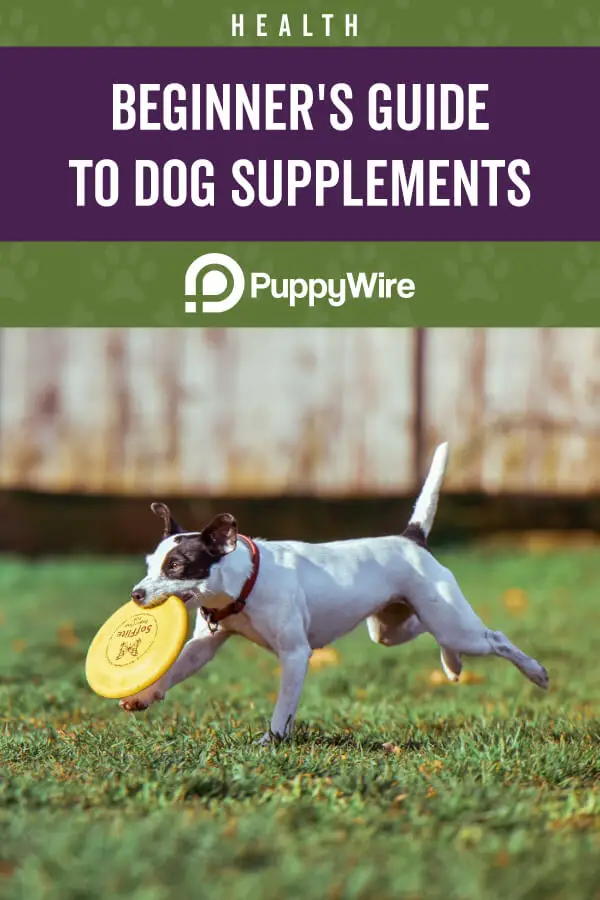Dog Supplements 101 – Beginner’s Guide to Canine Supplements

As the number of people taking supplements continues to grow, so do the number of people providing supplements to their pets. In fact, nearly one-third of pet owners are currently providing dog supplements to their canine friends.
Everything from multivitamins to supplements to help reduce shedding is currently available on the market and help to fuel a growing industry that has exceeded the $1 billion benchmark in only a few short years.
If you are considering providing your four-legged friend with supplements to help improve their overall health, then you have come to the right place. We here at Puppywire.com have taken the time to create one of the most comprehensive guides for canine supplements.
However, this is something you are going to see a lot in this post, see your veterinarian before you start giving your pet any supplements. Something that may appear to only be a minor issue could actually be a serious issue that all of the supplements in the world cannot fix. So, see your vet.
Does Your Dog Actually Need Supplements?
The need for the supplement and the manufacturing process of the supplement have a lot to do with answering this question. Unlike medications produced by pharmaceutical companies, dog supplements are currently not required to undergo clinical trials.
This makes finding factual information about supplements a bit of a challenge. The studies that have been conducted are showing mixed results.
One 2007 study in The Veterinary Journal reported that dogs suffering from osteoarthritis showed improved mobility and less pain after a 70-day treatment period. However, another study showed that humans suffering from arthritis were given the same supplements, glucosamine-chondroitin, and only those with mild to severe pain seemed to show any improvements.
In spite of this lack of information, there are a few things we know for sure. For example, fish oil supplements help reduce inflammation and fatty acids do help to make our pets coats look healthier. Natural antioxidants such as vitamin E and C also help to reduce inflammation but also have been shown to help with memory issues with dogs.
Are Dog Vitamins and Supplements Regulated?
Aside from the lack of mandatory clinical trials, dog vitamins and supplements are regulated by the Food and Drug Administration, FDA. Unfortunately, as we stated earlier, there is very little information currently available on supplements in this industry.
The good news, however, is that the National Animal Supplement Council is working to address some of the issues surrounding these supplements. The NASC is responsible for setting guidelines, testing products for its contents, and requires companies that manufacture supplements to report any adverse events.
Fortunately, they have around 135 companies, about 90 percent of the industry, that they monitor and conduct checks on to ensure the quality and safety of their products.
Are the Promised Nutrients Actually in the Supplements?
It seems that many of the individuals that own the companies manufacturing pet supplements either do not conduct a quality control check on their products or simply don’t care about what’s going on the store shelves so long as it is selling. A study by ConsumerLab.com was conducted on various glucosamine-chondroitin supplements for both humans and pets.
While only 25% of the human supplements failed the study, a whopping 60% of the pet supplements didn’t cut the mustard. The results were similar to studies conducted in joint support and probiotic supplements as well. With that said, make sure you use a trusted brand with a history of satisfied pet owners.
Are there Dangers Involved With my Pet Taking Supplements?
If your pet is on a balanced diet, they are more than likely receiving all of the vitamins and minerals they need. If this is the case with your dog, but you feel they are lacking nutrients, consult your veterinarian.
Giving your dog more vitamins and minerals than they need can have harmful side effects. For example, too much vitamin A can cause appetite loss, lethary, and even weight loss.
Typically though, vitamin A toxicity is rare unless your dog eats an entire bottle of vitamin A supplements or overfeeding of liver.
Too much vitamin D can cause muscle tremors, inhibit your dog’s appetite, or even cause seizures. Just like vitamin A, vitamin D toxicity is extremely rare unless your dog has ingested rodent killing agents.
What if There are Supplements in My Dog’s Food?
For many dogs, especially those on regulated diets, there are plenty of supplements already added to their daily meals. Glucosamine-chondroitin, for example, can be found in many dog food brands readily on the shelf.
Since there are many state regulations that cap the amount of glucosamine-chondroitin, the amount found is usually not a dose that can be considered therapeutic.
Some dog foods, mostly those prescribed by a veterinarian, may contain higher levels of supplements. DHA and botanicals are a couple of other supplements that are commonly found in prescription-based dog foods.
How Do I Choose the Right Supplement?
When it comes to selecting the right supplements for your pet, there are a plethora of questions you might be asking yourself.
There are three common “rules of thumb” that you can use while you are doing your shopping:
- Cost – While we tend to put costs and our budgets on the back burner when it comes to taking care of our four-legged babies, many budget-minded pet owners will notice that supplements, for canines and humans alike, can be very expensive. While cost alone is not a factor in determining if a specific supplement is what you are looking for, keep in mind that there are many cost-effective alternatives on the market.
- Product – The product you want should be of high quality, actually poses ingredients that are proven to be effective, and should have stamps or markings verifying its quality, such as the NASC seal, we will talk more about this one a little further on, or the Good Manufacturing Practices seal.
- The Manufacturer – There are hundreds of companies that are currently manufacturing pet supplements. However, that does not mean that they all make the same product or hold the same level of quality. Look for a company with a good reputation and a solid background.
If you think that is all there is to consider think again. Here is a list of helpful tips on what to look for in a pet supplement.
- One of the best ways of ensuring you are selecting a safe and quality supplement is by taking a trip to your vet’s office. Few issues have been found with the brands sold at many of the veterinarian offices across the country.
- Want to know specific information about a supplement, call the company. On most product packaging, you can find the contact information for the company that manufactured it. Ask them who created the product and what their background is.
- One of the best ways to ensure you are getting the right supplement is to look for a brand that specializes specific areas. They tend to be the most knowledgeable and you are more likely to achieve the results you are looking for.
- Familiarize yourself on the ingredients that are typically found in the supplements you are wanting. This will help in assuring you are getting what you need and not being confused by other supplements that may have similar-sounding names.
- If claims sound too good to be true, they probably are. Keep your distance from supplements that make lofty claims, such as alleviating diseases that are typically fatal.
- Just because there are a few human supplements that are safe to give to your pets, you should use extreme caution. Some supplements are not good for dogs and can be dangerous.
- Check for lot numbers on the bottle or another packaging. This is a good sign that the company has established quality control procedures. Those without such markings could indicate that the company is more concerned with producing a product rather than the health of your pup.
- Independent reviews from authoritative agencies are also a great way to validate the quality of the supplements. Look for tags, banners, or other forms of credentials, such as the NASC seal, that should be printed on the packaging or found and verified online.
The Bottom Line
While we all want our beloved pets to be in the best possible health, we have to make sure that our efforts are not having the adverse effects, such as providing supplements for extra vitamins and minerals.
However, it is our hope that this guide helps you find the right supplements, information, and knowledge so that you can have better peace of mind when selecting pet supplements. And don’t forget, consult with your vet before doing anything.
We hope you enjoyed this post and that it provided you with plenty of helpful information. We love feedback so please comment on situations you have found yourself in regarding this topic and what success you have had.
